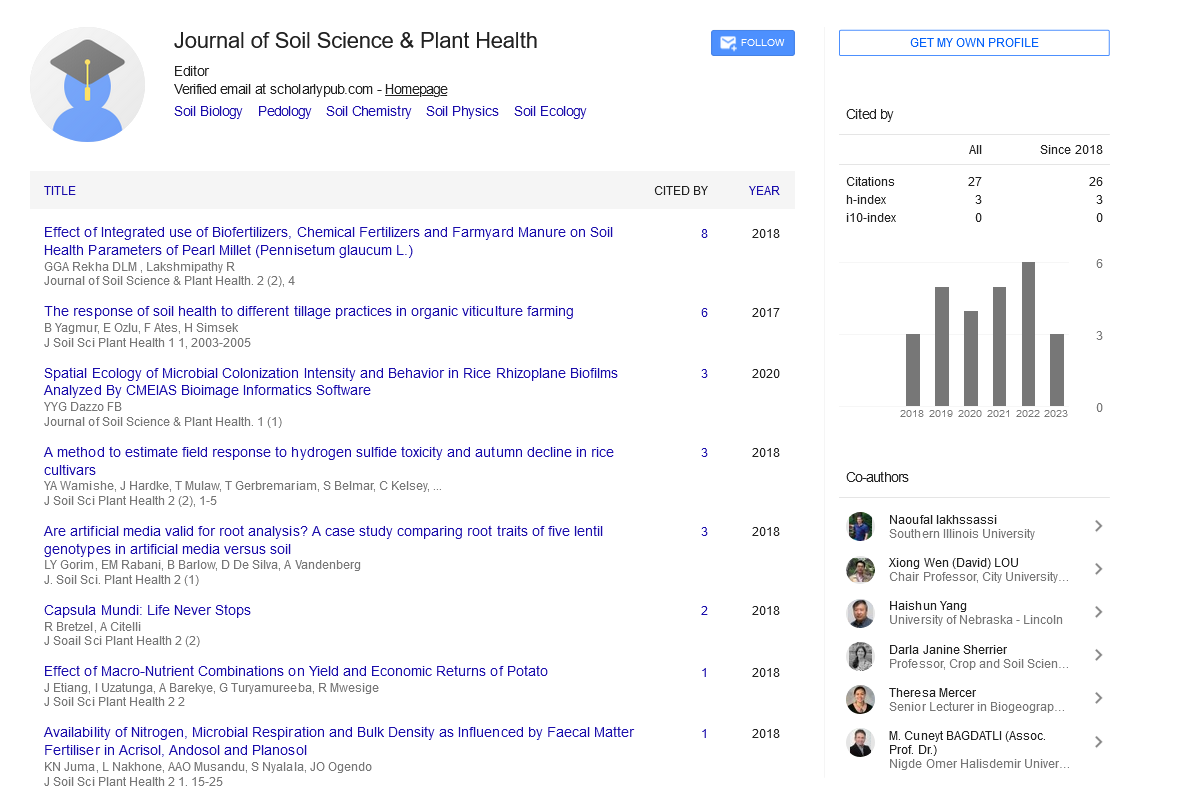Perspective, J Soil Sci Plant Nutr Vol: 7 Issue: 3
The Role of an Essential Nutrient in Plant Growth and Development
Ye Zhi*
1Department of Chemistry and Materials Science, Hunan Agricultural University, Changsha, China
*Corresponding Author: Ye Zhi,
Department of Chemistry and Materials Science,
Hunan Agricultural University, Changsha, China
E-mail: zhi@ye.edu.cn
Received date: 28 May, 2023, Manuscript No. JSPH-23-106973
Editor assigned date: 31 May, 2023, Pre QC No. JSPH-23-106973 (PQ);
Reviewed date: 14 June, 2023, QC No. JSPH-23-106973
Revised date: 22 June, 2023, Manuscript No. JSPH-23-106973 (R);
Published date: 28 June, 2023, DOI: 07.4172/jsph.1000196
Citation: Zhi Y (2023) The Role of an Essential Nutrient in Plant Growth and Development. J Soil Sci Plant Nutr 7:3.
Description
Plants require a range of essential nutrients to grow, develop, and reproduce. These nutrients play vital roles in various physiological processes, ensuring the proper functioning and optimal growth of plants. Among these essential nutrients, each nutrient has its unique role and significance. This article focuses on exploring the role of a specific essential nutrient in plant growth and development.
Nitrogen is one of the most crucial and abundant nutrients required by plants. It is a major component of amino acids, proteins, nucleic acids, and chlorophyll. Nitrogen is essential for various physiological processes in plants, including photosynthesis, protein synthesis, and energy metabolism. Photosynthesis is a fundamental process in plants, allowing them to convert light energy into chemical energy. Nitrogen plays a vital role in this process, as it is a component of chlorophyll, the pigment responsible for capturing light energy.
Adequate nitrogen availability ensures the efficient functioning of chlorophyll, enabling plants to perform photosynthesis effectively and produce carbohydrates, which are essential for plant growth and development. Proteins are essential for the structure and functioning of plant cells. Nitrogen is a primary component of amino acids, the building blocks of proteins. Adequate nitrogen supply enables plants to synthesize proteins, which are involved in various cellular processes, including enzyme activity, cell signaling, and transport of molecules. Proteins also play a crucial role in plant defense mechanisms, as they contribute to the production of defense-related compounds, such as enzymes and antimicrobial peptides. Nitrogen is also involved in energy metabolism in plants. It is a component of Adenosine Triphosphate (ATP), the primary energy currency in cells. ATP is essential for various energy-requiring processes in plants, such as nutrient uptake, active transport, and cellular respiration. Adequate nitrogen supply ensures sufficient ATP production, providing the energy required for plant growth and development. Furthermore, nitrogen influences plant growth and development by regulating cell division and expansion. Nitrogen availability affects the balance between vegetative growth (shoot and leaf development) and reproductive growth (flowering and fruiting). Insufficient nitrogen supply can lead to stunted growth, reduced leaf size, and delayed flowering. On the other hand, excessive nitrogen can promote excessive vegetative growth at the expense of reproductive development.
Plants obtain nitrogen from the soil in the form of inorganic nitrogen compounds, such as Nitrate (NO3-) and Ammonium (NH4+) . However, nitrogen availability in the soil can vary widely, depending on factors such as soil type, organic matter content, and fertilizer application. Nitrogen deficiency in plants can manifest as yellowing of leaves, stunted growth, and reduced overall vigor. To ensure adequate nitrogen supply, various agricultural practices are employed, including the application of nitrogen fertilizers and the use of nitrogen-fixing plants or microbes. Nitrogen fertilizers provide plants with readily available nitrogen, supplementing the natural nitrogen cycle. However, excessive and improper use of nitrogen fertilizers can lead to environmental issues, such as water pollution and greenhouse gas emissions. Thus, proper nutrient management practices are essential to balance nitrogen availability while minimizing environmental impacts.
In conclusion, nitrogen is an essential nutrient for plant growth and development. It plays a critical role in photosynthesis, protein synthesis, energy metabolism, and overall plant physiology. Nitrogen availability directly affects plant productivity, vegetative growth, reproductive development, and overall plant health. Understanding the role of nitrogen and implementing effective nutrient management practices are vital for sustainable agriculture, ensuring optimal plant growth while minimizing environmental impacts.
 Spanish
Spanish  Chinese
Chinese  Russian
Russian  German
German  French
French  Japanese
Japanese  Portuguese
Portuguese  Hindi
Hindi 